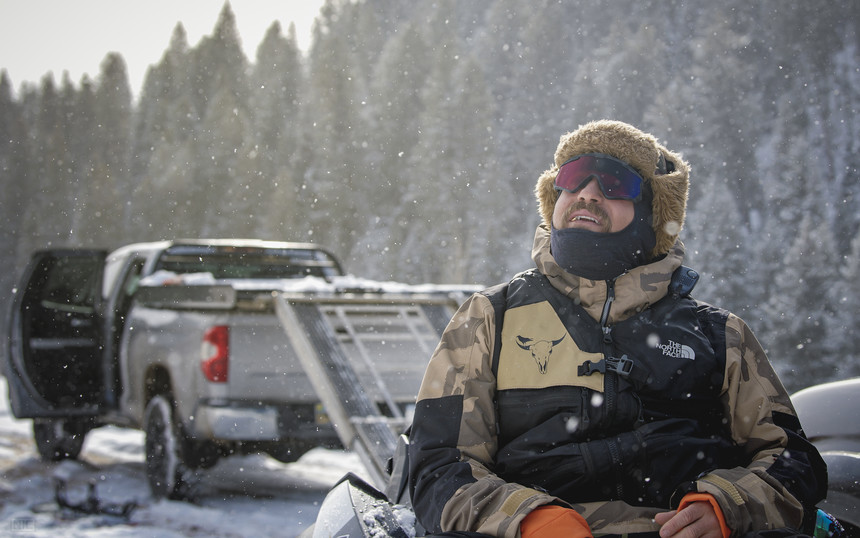
The Far Out Ones: Mark Carter
Story by Max RitterBefore he became a professional snowboarder, Mark Carter was a cowboy. Born and raised on the plains of Wyoming, he learned the value of hard work throughout his youth, tending to his family’s ranch, and sneaking off to the mountains to snowboard whenever possible. Translating that hard work ethic into snowboarding soon paid off, and Carter found himself showing off techy lines and insanely deep snow in his home mountains for silver screen. He has not forgotten that hard work gets you places, so this year, Carter joined Jeremy Jones and Robin Van Gyn on a mission to explore Montana’s Crazy Mountains on a foot-powered trip. The trio camped, climbing and riding dozens of big lines in an obscure range close to home. Check out the action in TGR’s Far Out, Presented by REI.
Your background is a little different than most in the ski world, what was it like growing up on a ranch in Wyoming?
Yeah it’s definitely a little unique! I was born and raised in Ten Sleep, Wyoming on a working cattle ranch. I grew up doing some real cowboy shit! The stuff I saw as a kid…looking back I am so fortunate to have been in that world of really hard working people, stewards of the land. I mean they were real cowboys, not just all hat, no ranch. These dudes live it and breath it. My old man, to this day, is a battle axe. Ranchers don’t retire. When you retire, you’re dead. You just keep moving. You look at these people, for example our veterinarian is 92 years old, and he still works every day. That’s what keeps him going.
So growing up there, you were just surrounded by this work ethic. Everybody is always working. Your worth is based upon what you bring to the table. If you’re on a ranch, and you don’t pull your weight, what are you doing here? Everybody needs to be moving in the same direction, and I was just taught that at a young age. We were brought up pretty tough. My generation, hate to say it, is one of the last generations that experienced that world of grit and hardship. There was no vacation, you never heard of people going to the beach or anything. You work every day, and then you die. It sounds tough, and it is, but there’s a balance of working hard that makes you happy.
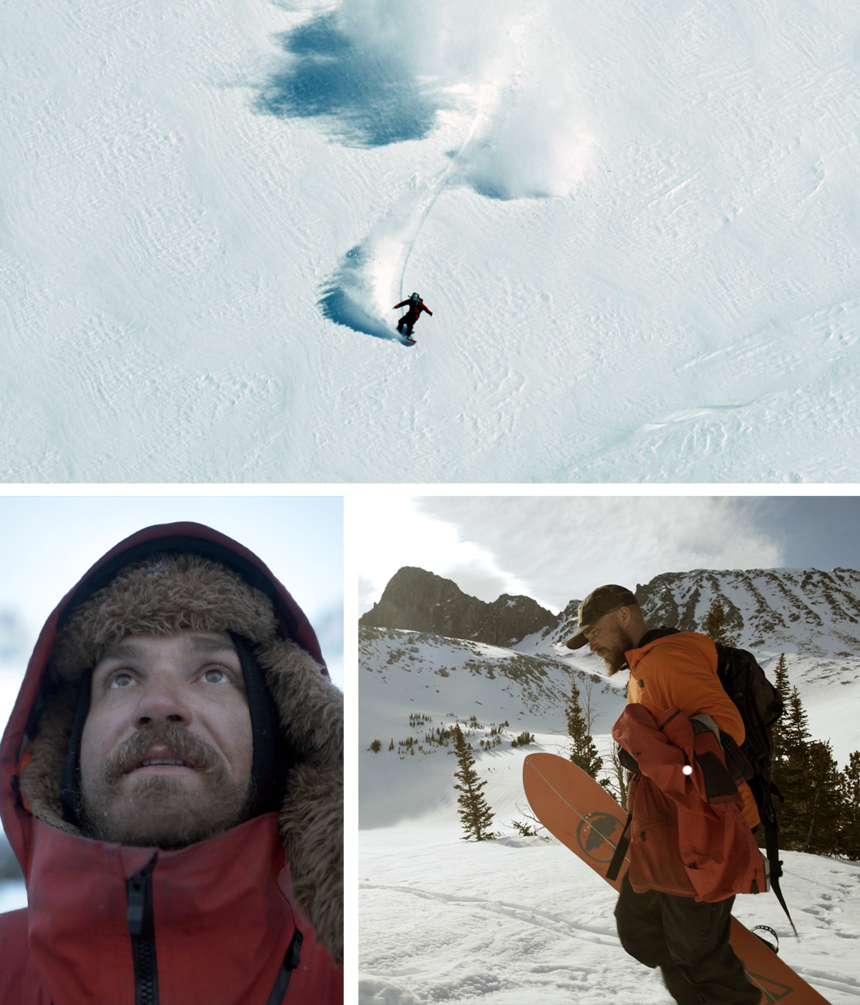 Mark Carter credits learning about the value of hard work at a young age to his snowboarding success.
Mark Carter credits learning about the value of hard work at a young age to his snowboarding success.
So how did that lead to a career in snowboarding?
I think it naturally translated to a career in snowboarding. I wouldn’t say that it was naturally easy, it was definitely a long road, but coming from that background, snowboarding was way easier than being a rancher. I’ll go home and dabble back in the ranch and realize that it just keeps going. Snowboarding, we’ll get days off, but on the ranch, you are at the mercy of the animals. So that life engrained a little grit and gratitude and molded me as a human. It’s honesty and integrity. In a world of smoke and mirrors, I think that’s why I’ve done well. In the world of snowboarding, if you base your whole identity on just that, when it’s over you’re done. You are expendable.
There’s obviously more to it than that, what sets your career apart from the rest?
So for me, snowboarding is really secondary to who I am. I want people to remember me for being kind and honest and a hard worker, not that I was good at snowboarding. I’m not the best snowboarder in the world, I’ve never been, but I work really hard and I have a unique story, and have somehow been able to keep this dream going. It’s partially making the right decisions, but also staying hungry by going back to the ranch and seeing that there’s more to life than just snowboarding.
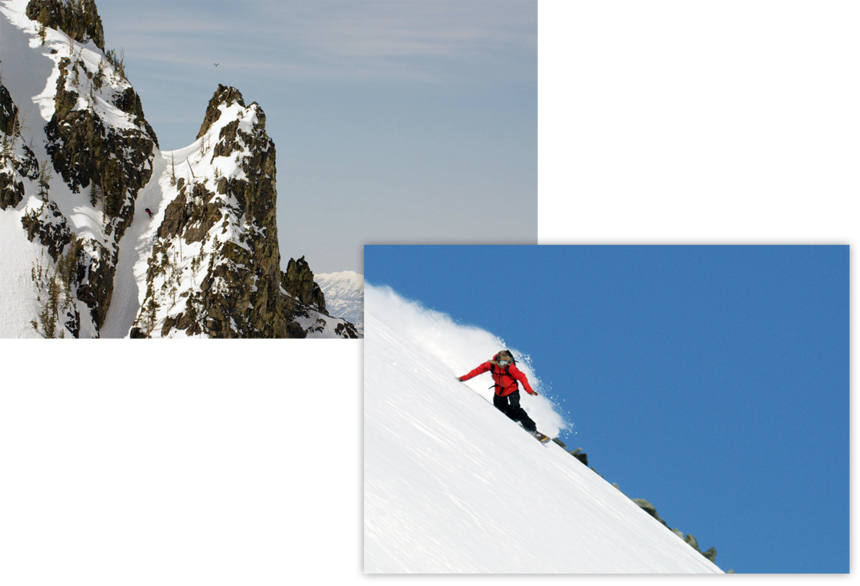 This year's trip Montana's Crazy Mountains resulted in epic lines for the whole crew.
This year's trip Montana's Crazy Mountains resulted in epic lines for the whole crew.
Nobody gives a f*** about my snowboarding in Ten Sleep. They’re like “that’s cool!” and are more interested in the places it takes me and the people I meet. Not just the actual snowboarding, but what’s behind it. Most people don’t know what it’s like to stand on top of a mountain with your butt cheeks clenched and fight through fear.
Tell me about some things you directly carried over from the ranch into your new career?
I was used to walking the line at a young age on the ranch. There were no safety measures in place. My dad was pretty loose, and always told that “you’re going to learn, and if you don’t, you’re going to learn the hard way.” Growing up, I rode horses that would just buck you in the middle of the cattle drive. You would walk for 20 miles if you didn’t get back on it. No matter how bad I didn’t want to get back on that horse, it was so scary, you had no other choice. Dealing with that as a kid taught me there was no giving up. There were days you were defeated, but I credit all my success to my background there.
Growing up, I rode horses that would just buck you in the middle of the cattle drive. You would walk for 20 miles if you didn’t get back on it
Do you get back to that world ever?
I’m definitely not a day-to-day rancher, but I do go back from time to time. I fully transitioned when I started making money snowboarding. Today, all the ranch work is volunteer work from me, and I love being able to give back that way. It’s good helping out the family and I fill in when I can. It’s still home and it’s a good world.
Over here, in Jackson, things are pretty shiny and people complain about whatever problems they have. Let’s face it, you only have one problem when you’re hungry. It’s a crazy world we live in!
What was the wildest thing that happened to you on the ranch?
I had a lot of crazy stuff happen to me, but I think one stands out: getting trampled by a horse as a kid. One of my dad’s horses literally ran me over when I was four years old. I’ve always loved animals, especially growing up. So we had this long feed bunk, and at the end of it, there was a shack where you unsaddle and throw your stuff. In the morning, the neighbor kids had been over and we had flipped this hay bale over to find a bunch of little pink mice. Later in the day, I wanted to go look at those again, and couldn’t flip the bale myself. My dad, meanwhile was always riding some sort of crazy horse, and came in on one and was unsaddling it right next to me. Of course, the horse spooked and he couldn’t get the cinches off in time. The saddle slid under the horse’s belly and it lost its shit. This thing came bucking and kicking and it just went right over the top of me. Next thing I know I woke up on the couch. My dad thought I was dead for sure. There was no hospital for miles, so they dragged me into the house and waited to see if I was going to wake up. Lo and behold, I woke up and somehow wasn’t hurt. Bruised up, but fine. From there, I just moved forward.
Life lessons. So how did snowboarding enter your life?
Growing up, we would sometimes go slide around at a little local hill Meadowlark, and I was always really drawn to the glide of it. My first experiences with snow weren’t snowboarding. It was getting pulled behind the truck on the ranch on our sleds. I was so drawn to it.
On Fridays, if you had good enough grades, you could get $3 lift tickets and the school bus would take you up. I skied for a couple of years, until I watched someone snowboard for the first time. This guy Charlie Hicks was just having way more fun than everyone else. There was something to the energy he gave off that really got me hooked, and he took me under his wing. I quickly learned how to do some tricks and make the most of getting air. In middle school I got really into it and started going to Mt. Hood for summer camp. I won a halfpipe contest there one summer, and realized hey I was pretty good. High school came around, and I somehow lost track of the path. I was playing football, and the mountain closed, so that took over. I got a scholarship to play football in college to play middle linebacker, but I quickly started to hate it.
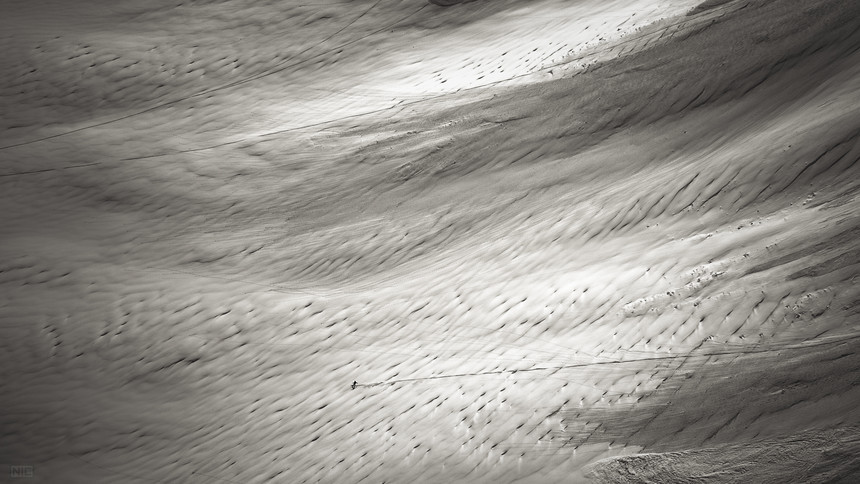
Carter has always felt a connection to big mountains.
I hadn’t snowboarded in years at that point, but went back out for a day and immediately realized what I was missing. I thought “what the f*** have I been doing?” It was so much fun, and went home to tell my dad I was done with football and dropping out of school. My dad gave me some advice: “Mark, you’ll always be ok if you know how to work hard.” That gave me a lot of comfort and security. I dropped out of school to work on the ranch for a year to save enough money to take a winter off and just go snowboard. I decided on moving to Bozeman and follow the dream.
You are well known for your segments shot around Jackson and Tetons. When did that enter your life?
I spent a winter at Bridger Bowl, shredding every day and eating ramen noodles. My gear was so old and outdated, I was total kook. One by one I upgraded my kit and started getting better again. The next winter I did it again, and that’s when my friends called me to move down to Jackson. Even growing up in Wyoming, I had never been there at that point. That year was when Travis Rice blew it up, putting Jackson on the snowboard map. I came down and rode with those guys and eventually landed a job on the Park and Pipe crew. It kind of snowballed from there leading to video parts with a bunch of crews including TGR. Travis vouched for me, and TGR was like “ok, want to go to Japan?” I landed a bunch of parts in videos that led me all over the world, but happily focused close to home.
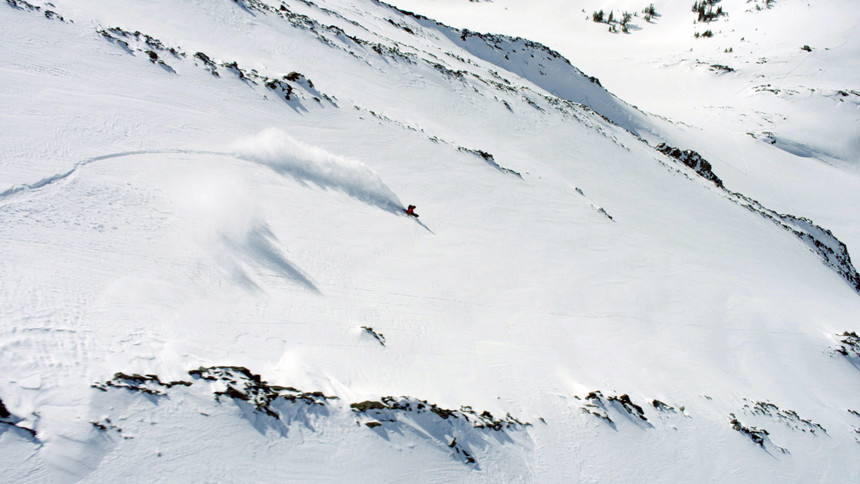
The trip to the Crazies proved to be Carter's first fully foot-powered mission.
This year, you joined Jeremy Jones and Robin Van Gyn on a mission close to home. The Crazies are, well, pretty crazy. How did that go down?
TGR came to me with that trip, and we’ve been wanting to do something up there for years. Living in Bozeman, I would drive past the Crazies, looking at this island of mountains in the middle of nowhere. I was fascinated, but never had a chance to go into them. The Crazies have some heavy medicine. They are super spiritual for the Crow Tribe, who would go there on vision quests. Those mountains are very unpredictable, and we learned that really quickly once we set foot in there. They had a different feeling than any other mountain range I’ve ever been to. The trip was very positive, but still felt very heavy somehow. The weather would change and it got really really gnarly in there.
The mountains were just beautiful though and the lines we rode were amazing. Having a good snow year really opened up a lot of options for us. With Jeremy as our leader, that made all the different. He motivated us to do things I normally wouldn’t have done. It was mountaineering-based, which was outside of my comfort zone. I can ride down anything, but the approach and the access to the top was challenging for both Robin and I. There were moments were Robin and I would look at each other and think, “Suck it up, we’re doing this! Follow Jer!”
It was inspiring.
They had a different feeling than any other mountain range I’ve ever been to. The trip was very positive, but still felt very heavy somehow.
What were some lessons learned from that trip?
The reason that trip was successful was thanks to the crew we assembled. Not just Robin and Jeremy, but our filmers and production crew. When you are out there, you are trusting your life to their hands if something goes wrong, so they better be good. Robin is a beast. I mean, I really hate the term "she's good for a girl." Robin blows that out of the water. She's really good, period. She's so knowledgeable and confident, and I trust that girl with my life in backcountry. If something went down, she would step up, and that's one of the most important things in backcountry partners: trusting each other.
It kind of goes back to the ranch. I look at the crew I would assemble on the ranch and say "are you going to pull your weight?" Because if you're not pulling you weight, and especially if your attitude sucks, I got nothing for you. That's the reality of it.
